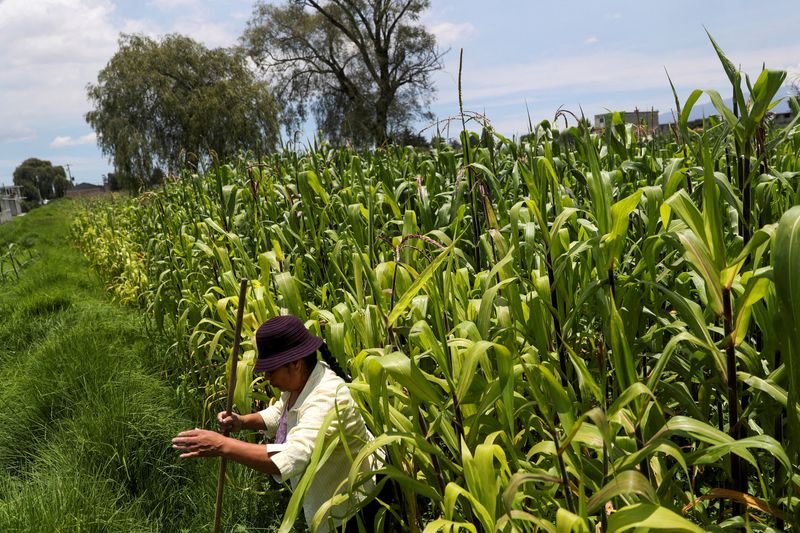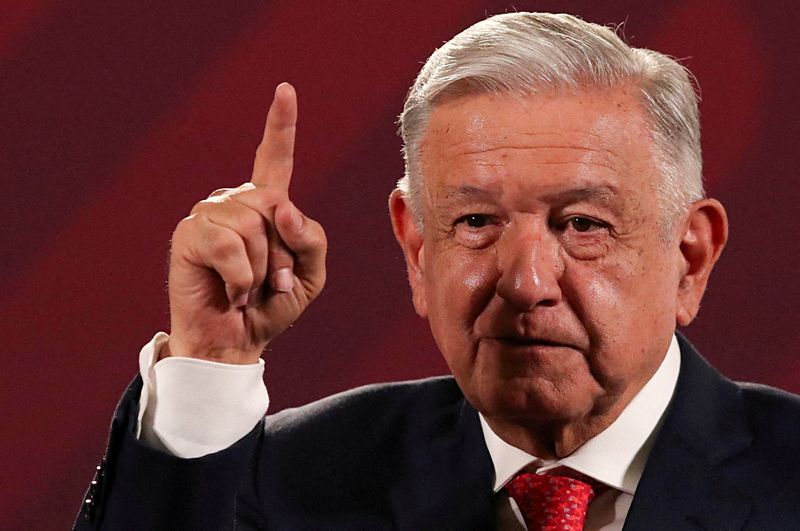By Cassandra Garrison
MEXICO CITY (Reuters) - Escalating tensions with farmers may prove a stumbling block for Mexico's ruling party in next year's elections, experts said, as resentment builds over low grains prices, a trade conflict with the U.S., and a perceived lack of government support.
Elections in June 2024 will not only usher in a new president, but dozens of Congressional and Senate seats, as well. Gubernatorial and local municipality positions are up for grabs, too.
President Andres Manuel Lopez Obrador's National Regeneration Movement (MORENA) party is favored to hold on to presidential power, but the rising conflict with the agriculture sector is emerging as a hurdle which could impact success at state and local levels, experts said.
The fallout is a rare chink in Lopez Obrador's formidable popularity, steadily above 60% throughout his term.
Producers staged dramatic protests this month, shutting down an international airport in Sinaloa to pressure the government to guarantee prices for corn, wheat and sorghum. A drop in international grains prices over the last year is killing their livelihoods, they said.
The most-active corn and wheat contracts on the Chicago Board of Trade (CBOT) have fluctuated but are both down about 21% compared to a year ago, as global supply concerns have eased.
Protests come amid a heated trade dispute with the United States over Lopez Obrador's decree to limit the use of genetically-modified (GM) corn, particularly for human consumption. Nearly all imports come from U.S. suppliers.
Mexico's agri-food sector makes up about 14% of the country's formal workforce, according to Bosco de la Vega, former president of top farm lobby CNA - a hefty chunk of voters, particularly in states like corn capital Sinaloa.
"The sector is not with this government," De la Vega said. "It could be a relevant problem both for the elections and for major conflicts in various cities."
The pricing issue is urgent as northern corn farmers are harvesting now, many with nowhere to sell without taking a loss. For producers fortunate enough to have storage, mountains of grain are sitting in warehouses around the country.
Lopez Obrador, who has prioritized aid to the nation's poor, said protesters are mostly larger producers, not small-scale farmers his government works to help. He publicly decried the protests as "blackmail" and has refused to negotiate with producers.
Farmers are unlikely to be sweet-talked by any of MORENA's main presidential hopefuls - Claudia Sheinbaum, Marcelo Ebrard and Adan Augusto. The three are generally reluctant to challenge the policies of the popular Lopez Obrador, who is limited to one term by Mexican law.
It is not the first time that tensions have heated up between this administration and the agriculture sector. In 2020, clashes between farmers and military police in drought-prone Chihuahua led to the death of a woman during protests over a plan to divert additional water to the U.S.
The country has seen farmer protests under previous governments, but they have escalated under Lopez Obrador.
Many Mexican producers have struggled since the beginning of the North American Free Trade Agreement (NAFTA) in 1994, which eliminated tariffs and opened the door for cheaper imports to flow into Mexico from the U.S. and Canada.
SECTOR BENEFITS ERASED
Issues within the sector are affecting producers of all sizes, said Baltazar Valdez, a protest leader and president of the United Farm Workers of Sinaloa who farms less than 10 hectares.
Valdez estimated that commercial agriculture producers represent about 10 million votes.
"I believe that a figure of this size can move the result of an election," he said, adding that many producers used to support the president.
Farmers argue Lopez Obrador's government has eliminated important sector benefits, including loans at beneficial interest rates, which his administration says too often fell into arrears. Other initiatives, like free fertilizer programs or cash handouts, tend to benefit smaller producers.
Segalmex, an agency created by Lopez Obrador which has been the target of multiple corruption accusations, will buy some of the current corn supply above market prices.
Still, many producers are left out of the scheme, especially those farming over 15 hectares, Valdez said.
The issues put Mexican farmers at a disadvantage to weather price falls compared to U.S. producers who receive benefits through a multi-billion dollar farm bill, said Raul Urteaga of consulting group Global Agrotrade Advisors.
"Mexico must design better agriculture subsidy programs, just like many successful producing countries," Urteaga said.
A spokesmen for Lopez Obrador did not respond to a request for comment. The Agriculture Ministry referred questions to the Finance Ministry and agricultural financing agency FIRA, where spokespeople did not comment.

Producers insist they will not be ignored.
"We are going to block all the candidates wherever they arrive. We will make a scene," said farm activist Luz Maria Mendoza.
